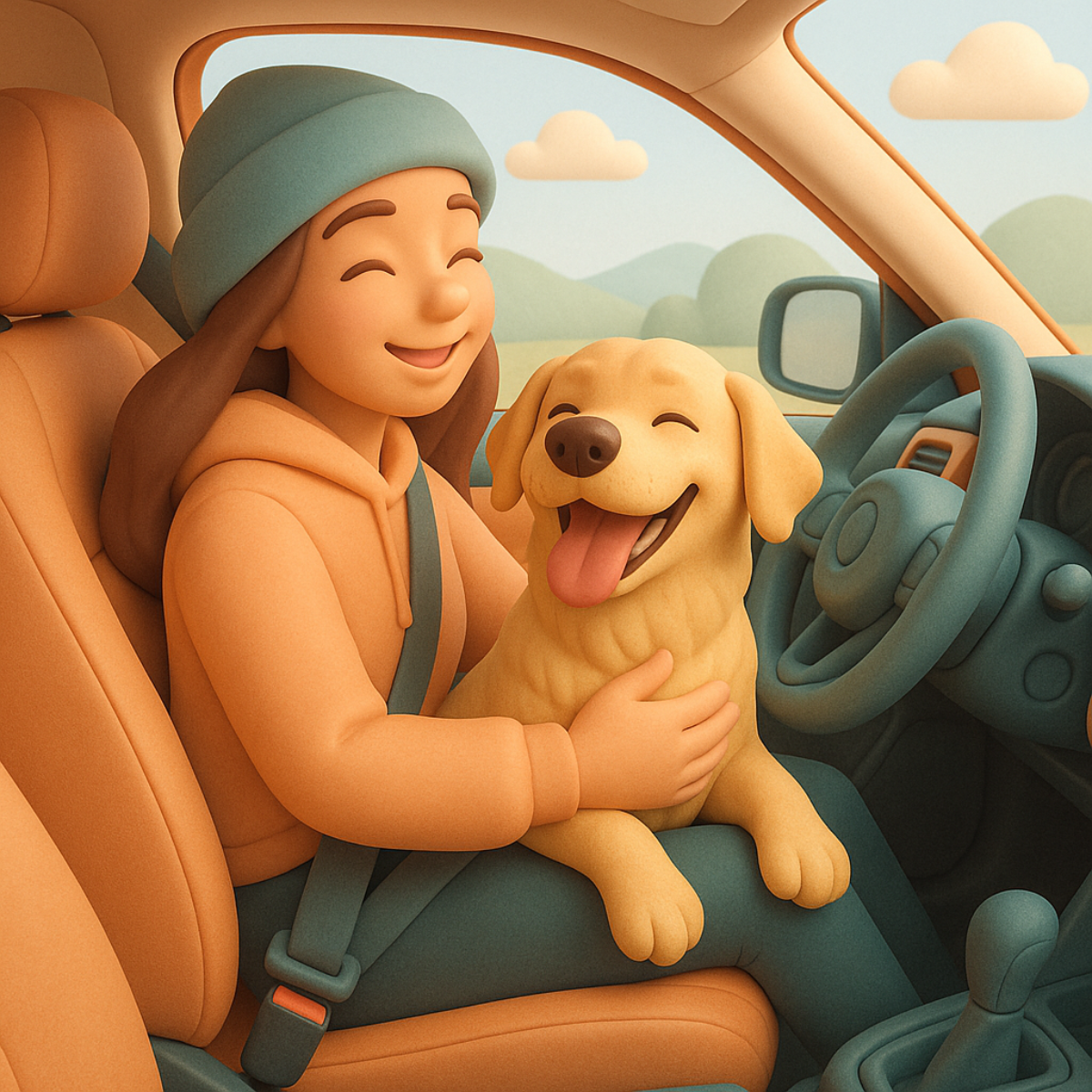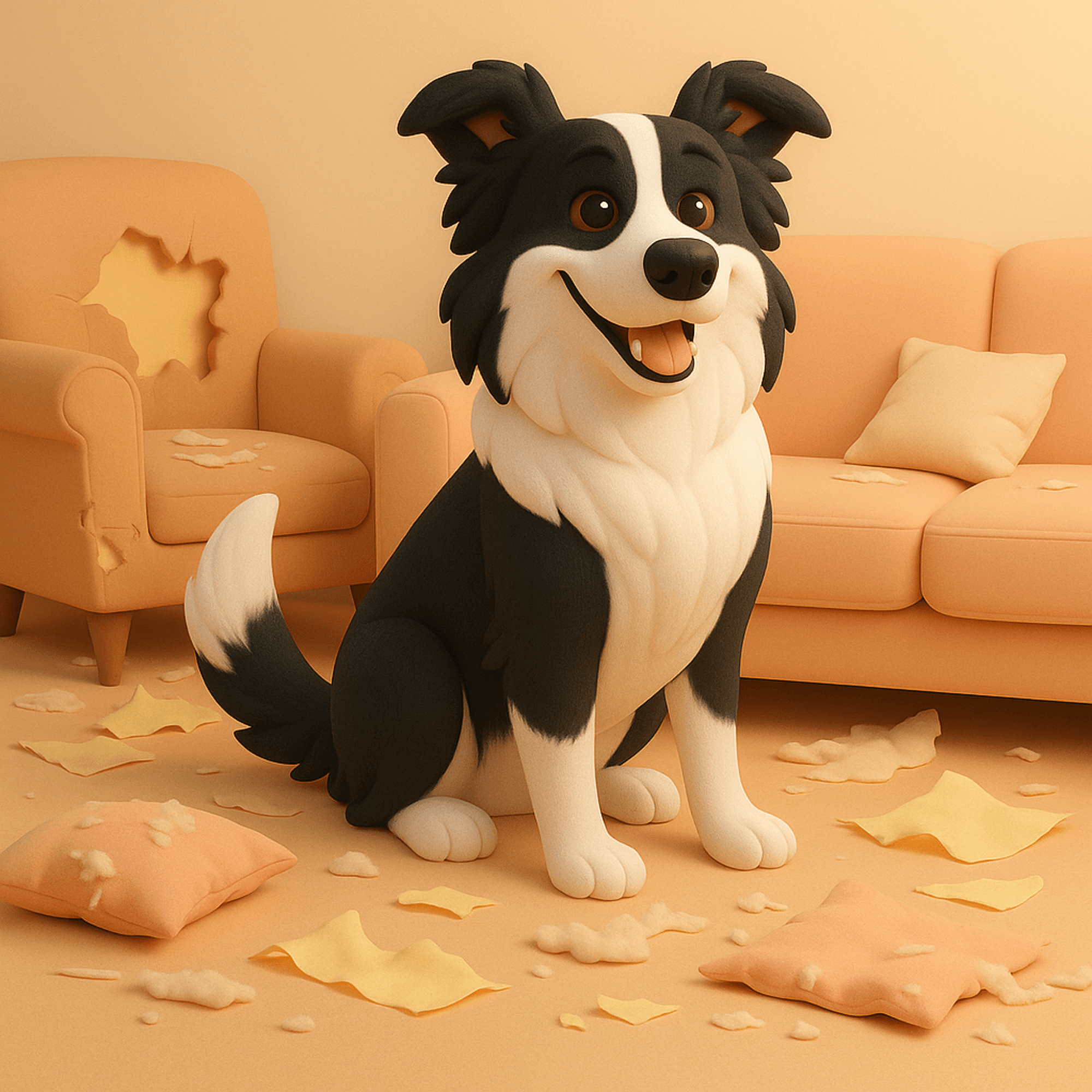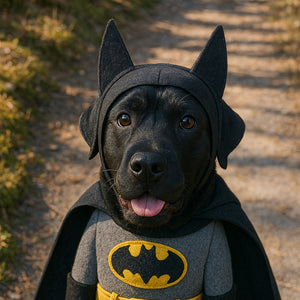
🧠 TOP 10 Most Intelligent Dog Breeds – Which Will Surprise You With Their Cleverness?
Dogs surprise us every day. Their ability to understand human speech, sense emotions, make independent decisions, and learn rapidly is not a myth, but a scientifically proven fact. In a world where artificial intelligence is much talked about, it's worth examining the most natural of intelligences: canine intelligence .
Have you ever wondered why your pet can sense your mood before you even say a word? Or how it's possible that they know the route to the park better than you do? Dogs possess not only the ability to learn commands, but also something more— smartness, adaptability, and emotional wisdom that humans sometimes lack.
This article isn't just a compilation of the smartest breeds. It's a story about how different facets of intelligence are revealed in the everyday relationships between humans and their four-legged friends.
Does your dog know what you're thinking before you say anything? Does he easily learn new tricks, or, on the contrary, cleverly avoid commands? Canine intelligence is a fascinating topic that behaviorists and scientists have been studying for years. But before we get to the rankings and data, learn the story of Luna – a dog who surprised her owner at the most unexpected moment...

In this article, you'll discover Dr. Stanley Coren's ranking of the 10 most intelligent dog breeds , and you'll also learn about a lesser-known facet of canine intelligence – emotional intelligence .
🐾 Worth knowing: Not every breed that shines in obedience tests will be the best choice for every owner. Intelligence is not just about "learning speed," but also emotional sensitivity and the ability to bond.
📚 What is dog intelligence?
📖 Who is Stanley Coren?
Dr. Stanley Coren is a professor emeritus of psychology at the University of British Columbia in Canada, internationally known for his research on canine behavior and cognition. His groundbreaking 1994 book , The Intelligence of Dogs, pioneered a new way of thinking about what "intelligence" truly means in the context of domestic dogs. Coren based his work on data collected from over 200 obedience judges in the United States and Canada.
🧪 How was the dog intelligence ranking created?
Coren's methodology involved assessing dogs in terms of:
- the number of repetitions needed to learn a new command,
- percentage of command execution success on the first attempt.
These results were specific to working (trainable) intelligence, not emotional or adaptive intelligence. This means that breeds like the Border Collie, Poodle, and German Shepherd excelled in obedience tests, but they aren't necessarily more "intelligent" than independent or emotionally deep breeds.
Important: Coren's ranking is one of the most frequently cited sources on the topic of canine intelligence, but it does not cover the entire spectrum of canine abilities.
Source: Stanley Coren – The Intelligence of Dogs (Wikipedia)
Canine intelligence is a complex phenomenon that encompasses various types of abilities—not just those related to obedience. Here are the three main categories of canine intelligence, according to Dr. Stanley Coren, broken down into separate sections:
🧬 Instinctive Intelligence
These are the innate abilities of a dog that result from its original purpose as a breed. For example:
- Border collie – herding sheep,
- Labrador retriever – fetching and water work,
- German Shepherd – guarding the flock and people.
It is this instinctive competence that makes a dog unique in a specific role.
🧠 Adaptive Intelligence
This is a dog's ability to independently solve problems and learn from experience. This is demonstrated, among other things, when a dog can:
- find your way home,
- solve a puzzle yourself (e.g. opening a gate),
- adapt your behavior to new situations.
Dogs with high adaptive intelligence can surprise with their creativity.
🎓 Training (working) intelligence
It's the ability to learn commands and cooperate with humans. Dr. Coren studied this type of intelligence when he compiled a ranking of the most intelligent breeds. Dogs such as Border Collies, Poodles, and German Shepherds learn in just a few tries and readily work with humans.
It was this last category that formed the basis of the famous Coren ranking, which was developed based on data from hundreds of professional dog trainers.

🔍 How to recognize an intelligent dog?
You don't have to be a scientist to notice that some dogs "pick it up quickly," while others take longer. Here are key signs that your dog is a canine genius :
- 🧠 Learns new commands quickly – responds correctly after just a few repetitions.
- 🧩 Solves problems independently – for example, knows how to open doors or find hidden treats.
- 👀 Observes people carefully – reacts to looks, gestures and tone of voice.
- 🤔 Remembers patterns and rituals – knows when you leave, knows your daily schedule.
- 🐾 Adapts to new situations – easily learns the rules in a new home or while traveling.
- ❤️ Reacts empathetically – comes to you when you are sad or worried.
Note: Intelligence doesn't always mean obedience! Some breeds, like the Shiba Inu or Basset Hound, are highly intelligent but naturally independent.

🏆 TOP 10 Most Intelligent Dog Breeds
📋 TOP 10 breed comparison table
| Race | Training intelligence | Physical activity | Training difficulty | For whom? |
| Border Collie | ★★★★★ | Very high | Mean | Active caregivers, sports |
| Poodle | ★★★★★ | Medium-high | Low | Families, seniors |
| German Shepherd | ★★★★★ | High | Low | Families, services |
| Golden retriever | ★★★★★ | Mean | Low | Families, children |
| Doberman | ★★★★★ | High | Mean | Experienced caregivers |
| Shetland Sheepdog | ★★★★★ | High | Mean | Families, agility |
| Labrador retriever | ★★★★★ | Medium-high | Low | Families, people with children |
| Papillon | ★★★★★ | Mean | Mean | Quiet people, lovers of small breeds |
| Rottweiler | ★★★★★ | High | Mean | Decisive people |
| Australian Cattle Dog | ★★★★★ | Very high | High | Active people who are passionate about working with dogs |
1. Border Collie
The world's most intelligent dog? The Border Collie is unrivaled in intelligence tests. It can learn a new command in less than five repetitions and responds to commands on the first try. It's a natural worker—it needs challenges, activity, and human contact.
Perfect for: active owners, dog sports enthusiasts, and those looking for a dog for intensive training.
2. Poodle
With beauty comes cunning! The Poodle—regardless of size—is smart, alert, and highly intelligent. It learns easily, is obedient, and adaptable. It's no wonder they are often used as therapy dogs or circus performers.
Perfect for: families, seniors, people looking for an elegant but intelligent companion.
3. German Shepherd
They're not just police dogs—they're also incredibly intelligent and devoted friends. Shepherds are brilliant, loyal, and make excellent family dogs. All it takes is consistency and attention, and they'll reciprocate with loyalty and vigilance.
4. Golden retriever
With a heart on their paws and a mind on their back, Golden Retrievers are not only friendly but also highly intelligent. Often used as guide dogs or therapy dogs, they easily learn new tasks and demonstrate great empathy.
5. Doberman
Strong, confident, and incredibly intelligent, Dobermans are quick learners, alert, and obedient. In the right hands, they become loyal companions and effective defenders.
6. Shetland Sheepdog
Small, but with a huge brain, Shetland Sheepdogs surprise with their rapid learning, energy, and loyalty. Perfect for sports, puzzle games, and family life.
7. Labrador retriever
Extremely popular for good reason – the Labrador is a natural learner. Eager to cooperate, warm, energetic, and intelligent, they make an excellent companion dog for children, seniors, and people with disabilities.
8. Papillon
Seemingly a gentle lapdog, but in reality a little genius, the Papillon (meaning "butterfly") is a quick learner, agile, and full of energy. Great for agility and educational games.
9. Rottweiler
Strength and intelligence in one body. Rottweilers are devoted, courageous, and highly trainable. However, they need an experienced owner who will provide them with clear boundaries and activities.
10. Australian Cattle Dog
One of the most underrated breeds in Poland. An agile, energetic, and incredibly intelligent working dog, it loves challenges, long walks, and mental tasks.
❤️ Emotional intelligence of dogs – as important as IQ
Not all manifestations of a dog's intelligence can be measured through tests or commands. Sometimes a single glance, a tender nuzzle into a lap, or a subtle change in behavior speaks volumes. A dog's emotional intelligence is its ability to read, react, and adapt to the emotions and moods of humans—and other animals.
Research shows that dogs can distinguish basic facial emotions: joy, anger, sadness, and surprise. They respond to these emotions through body posture, facial expressions, and behavior—often with greater empathy than some humans.
Interestingly, some breeds exhibit a particular "emotional sensitivity." This applies to both family dogs and ancestral breeds that have coexisted with humans for centuries, not necessarily as workers—but as companions, observers, and quiet friends.

🐾 "Smart Guys Beyond the Corena Ranking" – The Surprising Intelligence of Dogs
Not all intelligent dogs make it into traditional rankings. Some breeds possess independent thinking, strong personalities, and intuition that are difficult to measure with obedience tests. Here are a few examples:
- Beagles are considered "deaf to commands," but that's only because their nose outweighs the human voice. They're an exceptionally intelligent tracker and troublemaker.
- French Bulldog – may not be a star in agility, but he is excellent at reading his owner’s emotions and finds his way in city life.
- The Basenji is a dog without a bark, but with tremendous cunning. Often compared to a cat, it is independent, clean, and self-reliant.
- Chow Chow – few people know that this proudly walking ball of fur is a dog with a strong sense of self-esteem and the ability to assess situations.
🧠 Remember: A dog's intelligence is not only about "sit" and "fetch", but also independence, empathy and the ability to adapt to the human world.
🐶 Tosa inu
Reserved, alert, and incredibly loyal, the Tosa is a dog that doesn't require constant training—it simply is . It observes, feels, and makes decisions from an inner peace. In its relationship with its owner, it earns a reputation as a quiet yet highly sensitive companion.
🐶 Shiba inu
They have a reputation for being "difficult to train," but they're simply a dog with an independent intelligence . The Shiba doesn't need approval—they act on their own initiative, but if they trust you, the bond will be incredibly deep.
🐶 Cavalier King Charles Spaniel
A true "emotion reader," the Cavalier can sense its owner's sadness, joy, and tension. It makes an excellent companion and therapy dog.
🐶 Miniature Pinscher
Smart, lively, and with a huge need for closeness, the Pinscher is a dog brimming with emotion, capable of both moving and making you laugh. He needs contact and attention – that's when he thrives.
🔍 How to support the development of a dog's intelligence?
Regardless of breed, every dog deserves mental stimulation. Developing a dog's mind isn't just a privilege—it's a responsible owner's responsibility. Here are proven methods that support your dog's cognitive, emotional, and social development:
🎲 1. Educational and olfactory toys
Sniffing toys, licking mats, and puzzles with treats encourage your dog to think logically and actively explore. For example, this croissant-shaped toy from PETTO is a great way to combat boredom and stimulate the brain.
🐾 2. Reward-Based Training
Use positive methods: reward good behavior with treats, praise, or toys. Avoid punishments – not only do they fail to teach, but they can also destroy trust.
🐕 3. Variety of walks
New walking routes are like “reading a newspaper” for your dog – exploring smells, observing the surroundings and interacting with other dogs or people stimulates the brain and teaches social behavior.
🧩 4. Learning commands and tricks throughout life
Even seniors love learning new things. Simple commands ("stay," "give me your paw") or more advanced ones ("close the door," "bring me a blanket") keep their brains sharp.
🧠 5. Logical games and nosework
Hiding treats, playing guessing games, or learning to recognize objects by name develops adaptive intelligence. Nosework can even be practiced at home!
💬 6. Conversation, attention, contact
Talk to your dog. Respond to his emotions. Monitor his signals. Dogs who feel understood develop stronger bonds and a greater willingness to cooperate.
🐶 Remember: Boredom and frustration are the enemies of a dog's intelligence. The more engaged a dog is, the more it will develop its talents.
💬 TOP 3 myths about dog intelligence
1. Small dogs are dumber than big ones – FALSE
This is a harmful myth that is not supported by any research. Papillons, Miniature Pinschers, and Yorkshire Terriers can be just as intelligent (and sometimes more so!) than their larger cousins. Just because they are more likely to be spoiled doesn't mean they lack cognitive abilities—they simply don't have the opportunity to develop them.
2. Obedience = wisdom – NOT NECESSARILY
Some dogs are highly intelligent, but by nature independent and don't see the point in following every command. Shiba inu, Basset hound, and Akita inu are breeds that make decisions based on their own beliefs—this isn't a lack of knowledge, but a strong personality. Intelligence also means the ability to think independently!
3. Older dogs don't learn anymore - NONSENSE
Older dogs can learn new commands, tricks, and behaviors—you just need to adjust the pace and methods. In fact, training a senior can strengthen their sense of security, stimulate their brain, and improve their well-being. Wisdom knows no age—even in dogs!
❓ FAQ: Frequently asked questions about dog intelligence
Can I increase my dog's intelligence?
Yes! While genetics play a role, a dog's mental development is greatly influenced by their environment, play, interaction, and positive training. Regular mental exercises, new challenges, and strengthening the bond with their owner effectively support a dog's cognitive development.
Can any dog be intelligent?
Every dog has different talents. Some pick up commands quickly, others read emotions, and still others are excellent trackers. Intelligence isn't a race – what matters is individuality and understanding the needs of a specific dog.
Why doesn't my dog want to learn?
The reasons may be varied: lack of motivation, stress, misunderstanding instructions, or… an overly monotonous approach. It's worth changing the form of play, rewards, or trying to work with a behaviorist.
Are female dogs smarter than male dogs?
There's no hard evidence that gender influences intelligence. Some studies suggest that female dogs tend to be more focused and male dogs more impulsive, but it all depends on personality.
Does castration affect a dog's intelligence?
Neutering does not lower intelligence. It may affect hormonal levels and behavior, but it does not impair cognitive abilities.
🐕 Summary – A smart dog is a happy dog
Dog intelligence comes in many forms, from spectacular tricks to silent understanding. When choosing a pet, it's worth considering not only their ranking but also what we need from the relationship: are we looking for a sporty companion or a calm friend who understands us without words?
Dog intelligence comes in many forms, from spectacular tricks to quiet understanding. Some dogs amaze us with their obedience and learning speed, while others amaze us with their ability to observe, sense emotions, or creatively approach everyday situations.
What truly distinguishes a smart dog is its ability to live in harmony with humans—to read our moods, needs, and intentions. This is why emotional intelligence becomes just as important as the ability to master commands.
Remember: a dog doesn't need to know dozens of tricks to be smart. Sometimes, one look is enough to know that there's something more between you—trust, understanding, and a shared emotional space.
🎯 The best proof of a dog's intelligence is how much they become a part of your life—not as a student, but as a partner. When choosing a pet, it's worth considering not only their ranking but also what we need from the relationship: are we looking for a sporty companion or a calm friend who understands us without words?
🎯 Regardless of breed, what matters most is how you love and understand your dog. Because it's this bond that is the greatest proof of intelligence... on both sides.
🌐 External scientific sources and authorities
- Stanley Coren – The Intelligence of Dogs (Wikipedia)
- Stanley Coren - Official Website
- Marc Bekoff – Dog Smart: The Science and Secrets of Canine Intelligence (Psychology Today)
- Daniel Mills – Scientific Profile (Wikipedia)
- Chaser – the dog with the largest vocabulary (Wikipedia)
- Rico – Research on Dog Vocabulary (Wikipedia) psychologytoday.com
📚 Additional materials
- 🏙️ Best dogs for apartments – breed ranking
- 💬 How Do Dogs Show Affection? Signals You Should Know
- 🐕 Is your dog pulling on the leash? Find out how to fix it.
- 🚗 How to safely transport a dog in a car?
- 🐾 How to teach your dog to stay home alone
- 🛏️ Can a dog sleep in bed with its owner? Facts, myths, and behavioral advice.
See more at: Petto.com.pl
























 https://petto.com.pl
https://petto.com.pl